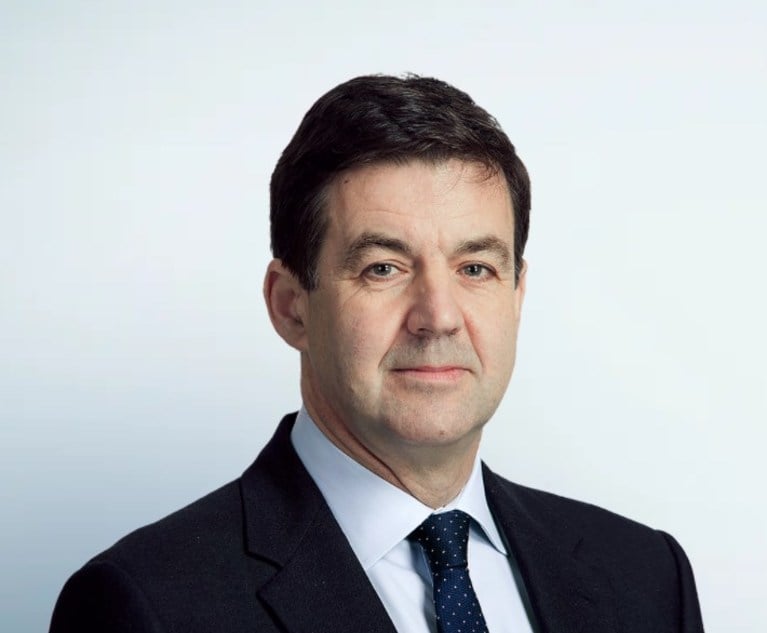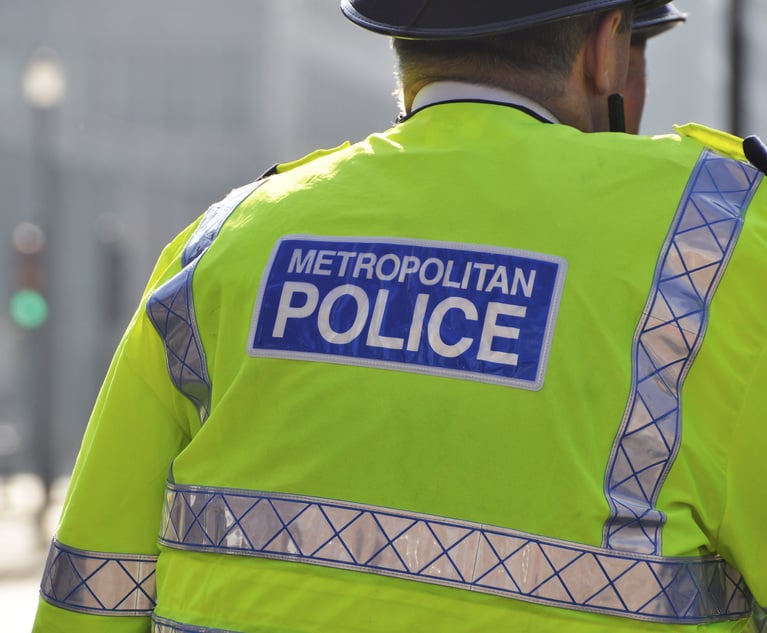 The Huawei Technologies Co logo in an exhibition hall at the company's headquarters in Shenzhen, China. Photo: Giulia Marchi/Bloomberg
The Huawei Technologies Co logo in an exhibition hall at the company's headquarters in Shenzhen, China. Photo: Giulia Marchi/BloombergHuawei Calls for Trust and Transparency Through Common Cybersecurity Standards
Huawei deputy chairman Ken Hu's call for governments, regulators and other stakeholders to collaborate and create common cybersecurity standards is great, but experts are skeptical about the lack of detail.
March 06, 2019 at 04:44 PM
3 minute read
The original version of this story was published on Corporate Counsel
Espionage suspicions and criminal charges have been buzzing around Huawei Technologies Co Ltd, which threatens to hamper the Chinese telecom giant's plans to be a worldwide player in 5G wireless technology.
So it was noteworthy, and perhaps a bit unsurprising, when Huawei deputy chairman Ken Hu stood before an audience gathered Tuesday in Brussels and made a pitch for transparency and trust by calling on governments, regulators and other stakeholders to collaborate and create common cybersecurity standards.
Hu seems to have said the right things, according to U.S.-based cybersecurity experts. But what he's calling for is a lot like a plea for world peace, said Bruce Schneier, a security technologist and a special adviser to IBM Security.
"So, yeah, of course we should have peace. But what exactly does that mean?" Schneier said. "The devil is in the details."
Hu spoke during the opening ceremony of Huawei's Cyber Security Transparency Centre, which the company said will be open to customers and independent organisations seeking to test Huawei's products and software "according to industry-recognised cybersecurity standards and best practices".
During his speech, Hu applauded the European Union's General Data Protection Regulation, saying he believed "European regulators are on track to lead the international community in terms of cybersecurity standards and regulatory mechanisms". He added that transparency and trust should be based on facts that can be verified under common standards.
Huawei stated in a news release that developments in information and communication tech "are posing unprecedented challenges" related to cybersecurity, and the "lack of consensus on cybersecurity, technical standards, verification systems and legislative support, further exacerbates these challenges".
Hu told the audience in Brussels that a system of common cybersecurity standards would serve as "an effective model to build trust for the digital era".
David Katz, a partner at Adams and Reese in Atlanta who specializes in cybersecurity, privacy and data protection, agreed that common standards are needed, otherwise "there's always a risk that there will be disagreement about what is acceptable".
But he noted that the various stakeholders will likely have different ideas about best practices for security. He also wondered how a unified standards system would keep pace with cybersecurity threats that are constantly changing and evolving.
"In principle, it makes sense," he said. "But unless there's some sort of centralised authority that can maintain the standard globally, there are going to be challenges in creating some uniformity."
Read More:
This content has been archived. It is available through our partners, LexisNexis® and Bloomberg Law.
To view this content, please continue to their sites.
Not a Lexis Subscriber?
Subscribe Now
Not a Bloomberg Law Subscriber?
Subscribe Now
NOT FOR REPRINT
© 2025 ALM Global, LLC, All Rights Reserved. Request academic re-use from www.copyright.com. All other uses, submit a request to [email protected]. For more information visit Asset & Logo Licensing.
You Might Like
View All
Freshfields' Former Senior Partner Braham Knighted in New Year’s Honours
3 minute read
Trio Of Firms Bag Roles In JSW Energy’s $1.5B Acquisition In India

Brazilian Firms Demarest, BMA, TozziniFreire Elevate Lawyers to Partner
Trending Stories
- 1'True Leadership Is About Putting Others First': 2024 In-House Award Winners Inspired, Took Road Less Traveled
- 2A Q&A with Sidley Austin's London Leader
- 3New York-Based Harris Beach Combines With Connecticut-Based Murtha Cullina, Forming NE Powerhouse
- 4New Year, New Am Law 100: Challenges Await These Newly Merged Law Firms
- 5Thursday Newspaper
Who Got The Work
Michael G. Bongiorno, Andrew Scott Dulberg and Elizabeth E. Driscoll from Wilmer Cutler Pickering Hale and Dorr have stepped in to represent Symbotic Inc., an A.I.-enabled technology platform that focuses on increasing supply chain efficiency, and other defendants in a pending shareholder derivative lawsuit. The case, filed Oct. 2 in Massachusetts District Court by the Brown Law Firm on behalf of Stephen Austen, accuses certain officers and directors of misleading investors in regard to Symbotic's potential for margin growth by failing to disclose that the company was not equipped to timely deploy its systems or manage expenses through project delays. The case, assigned to U.S. District Judge Nathaniel M. Gorton, is 1:24-cv-12522, Austen v. Cohen et al.
Who Got The Work
Edmund Polubinski and Marie Killmond of Davis Polk & Wardwell have entered appearances for data platform software development company MongoDB and other defendants in a pending shareholder derivative lawsuit. The action, filed Oct. 7 in New York Southern District Court by the Brown Law Firm, accuses the company's directors and/or officers of falsely expressing confidence in the company’s restructuring of its sales incentive plan and downplaying the severity of decreases in its upfront commitments. The case is 1:24-cv-07594, Roy v. Ittycheria et al.
Who Got The Work
Amy O. Bruchs and Kurt F. Ellison of Michael Best & Friedrich have entered appearances for Epic Systems Corp. in a pending employment discrimination lawsuit. The suit was filed Sept. 7 in Wisconsin Western District Court by Levine Eisberner LLC and Siri & Glimstad on behalf of a project manager who claims that he was wrongfully terminated after applying for a religious exemption to the defendant's COVID-19 vaccine mandate. The case, assigned to U.S. Magistrate Judge Anita Marie Boor, is 3:24-cv-00630, Secker, Nathan v. Epic Systems Corporation.
Who Got The Work
David X. Sullivan, Thomas J. Finn and Gregory A. Hall from McCarter & English have entered appearances for Sunrun Installation Services in a pending civil rights lawsuit. The complaint was filed Sept. 4 in Connecticut District Court by attorney Robert M. Berke on behalf of former employee George Edward Steins, who was arrested and charged with employing an unregistered home improvement salesperson. The complaint alleges that had Sunrun informed the Connecticut Department of Consumer Protection that the plaintiff's employment had ended in 2017 and that he no longer held Sunrun's home improvement contractor license, he would not have been hit with charges, which were dismissed in May 2024. The case, assigned to U.S. District Judge Jeffrey A. Meyer, is 3:24-cv-01423, Steins v. Sunrun, Inc. et al.
Who Got The Work
Greenberg Traurig shareholder Joshua L. Raskin has entered an appearance for boohoo.com UK Ltd. in a pending patent infringement lawsuit. The suit, filed Sept. 3 in Texas Eastern District Court by Rozier Hardt McDonough on behalf of Alto Dynamics, asserts five patents related to an online shopping platform. The case, assigned to U.S. District Judge Rodney Gilstrap, is 2:24-cv-00719, Alto Dynamics, LLC v. boohoo.com UK Limited.
Featured Firms
Law Offices of Gary Martin Hays & Associates, P.C.
(470) 294-1674
Law Offices of Mark E. Salomone
(857) 444-6468
Smith & Hassler
(713) 739-1250







